Chicken Keeping & Coops In Connecticut
Are you hoping to start keeping chickens in Connecticut? We have all the information you need to make your new hobby a success. Learn about the perfect coop for the Connecticut climate and chicken breeds best suited to the harsh winters. You can also find an Omlet ambassador near you to chat with about all things Omlet chicken coops and flockraising in Connecticut.
Page Contents:
Which chicken coop is best for Connecticut?
Speak to an Omlet chicken keeper in Connecticut
Chicken keeping Facebook groups in Connecticut
Protecting your flock from Connecticut weather
Chicken breeds suited to Connecticut weather
Common chicken predators in Connecticut
Do I need planning permission for my Connecticut Chicken Coop?
Which chicken coop is best for Connecticut?
Finding the right chicken coop for your Connecticut hens will help make flock keeping really straight forward. You should check the zoning restrictions in your area because this will normally determine how many chickens you are able to have and what size coop you will need. You should also consider if you want to move your chicken coop around your backyard.
Eglu Cube Chicken Tractor
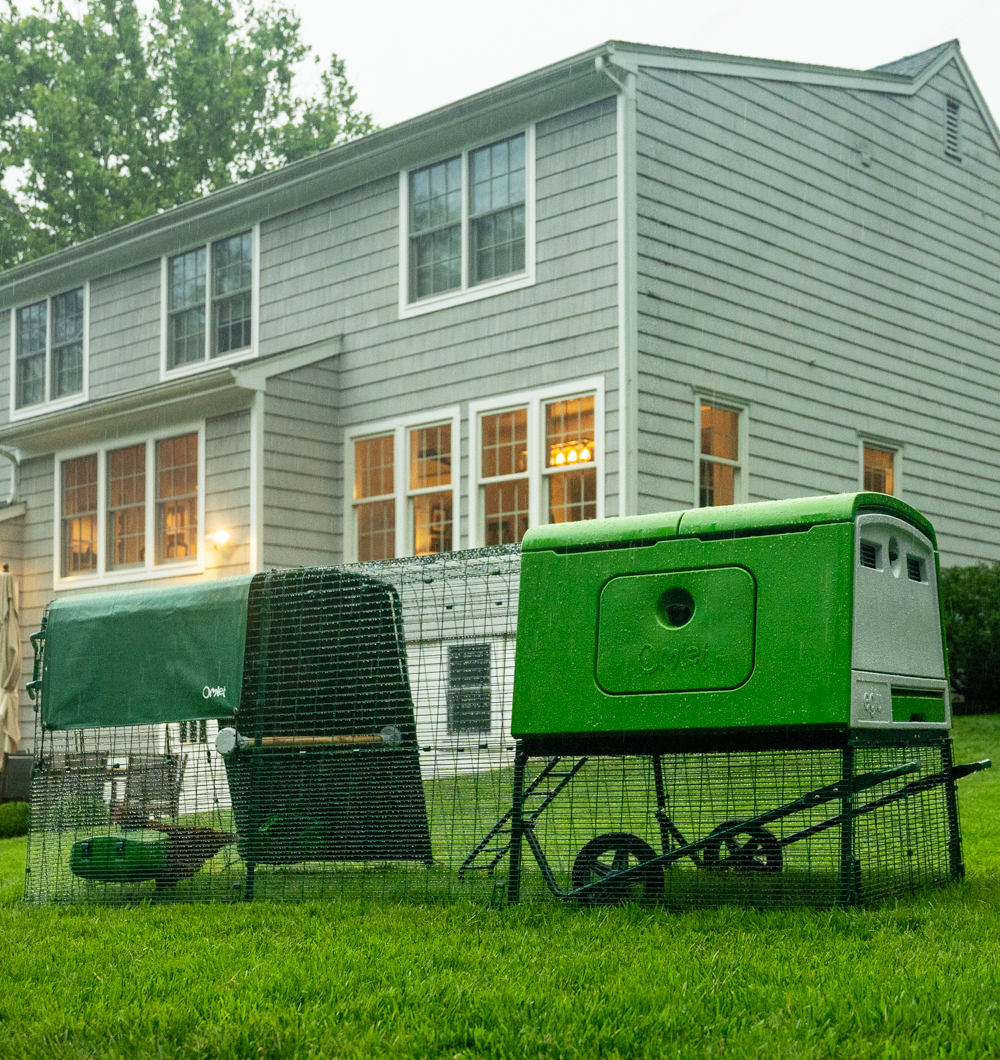
Omlet's easy to move Eglu Cube chicken coop.
Eglu Cube Chicken Tractor
If you are planning to move your Connecticut chicken coop around the backyard then you need an easy to move chicken tractor like the Eglu Cube with wheels and handles.
Eglu Cube with Walk In Chicken Run
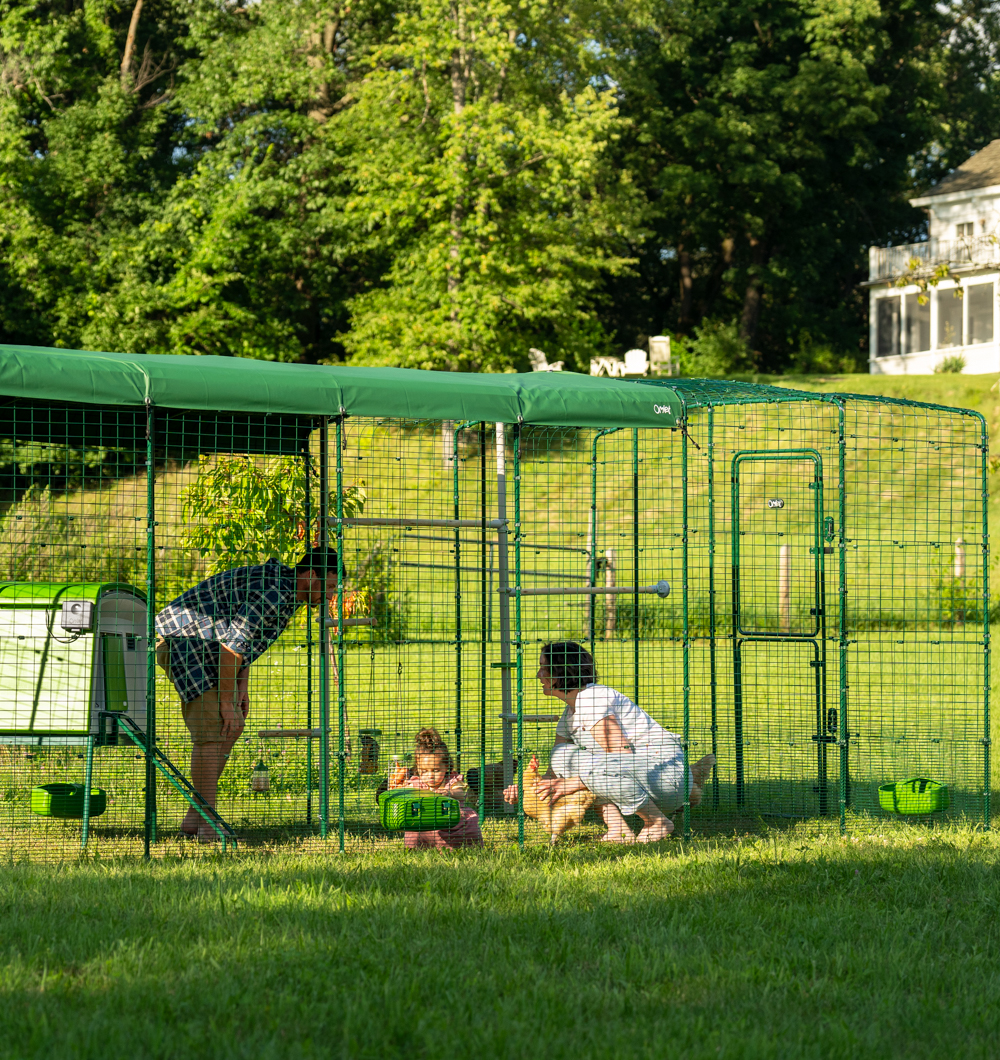
Omlet Eglu Cube in a large Walk In Chicken Run in Connecticut.
Eglu Cube with Walk In Chicken Run
If you don't plan to move your chickens around your backyard and would prefer a stationary set up, then consider attaching an Eglu Cube chicken coop with a Walk In Chicken Run. It is important to note that the Walk In Run is extendable at any time - so you can start with a 6ft by 6ft run and increase the space as your flock grows.
Ambassadors
Speak to an Omlet chicken keeper in Connecticut
Omlet ambassadors are on hand to help you make the right coop choice for your chickens, by phone, email, video call, or in person. Find an Eglu owner in Connecticut on the map.
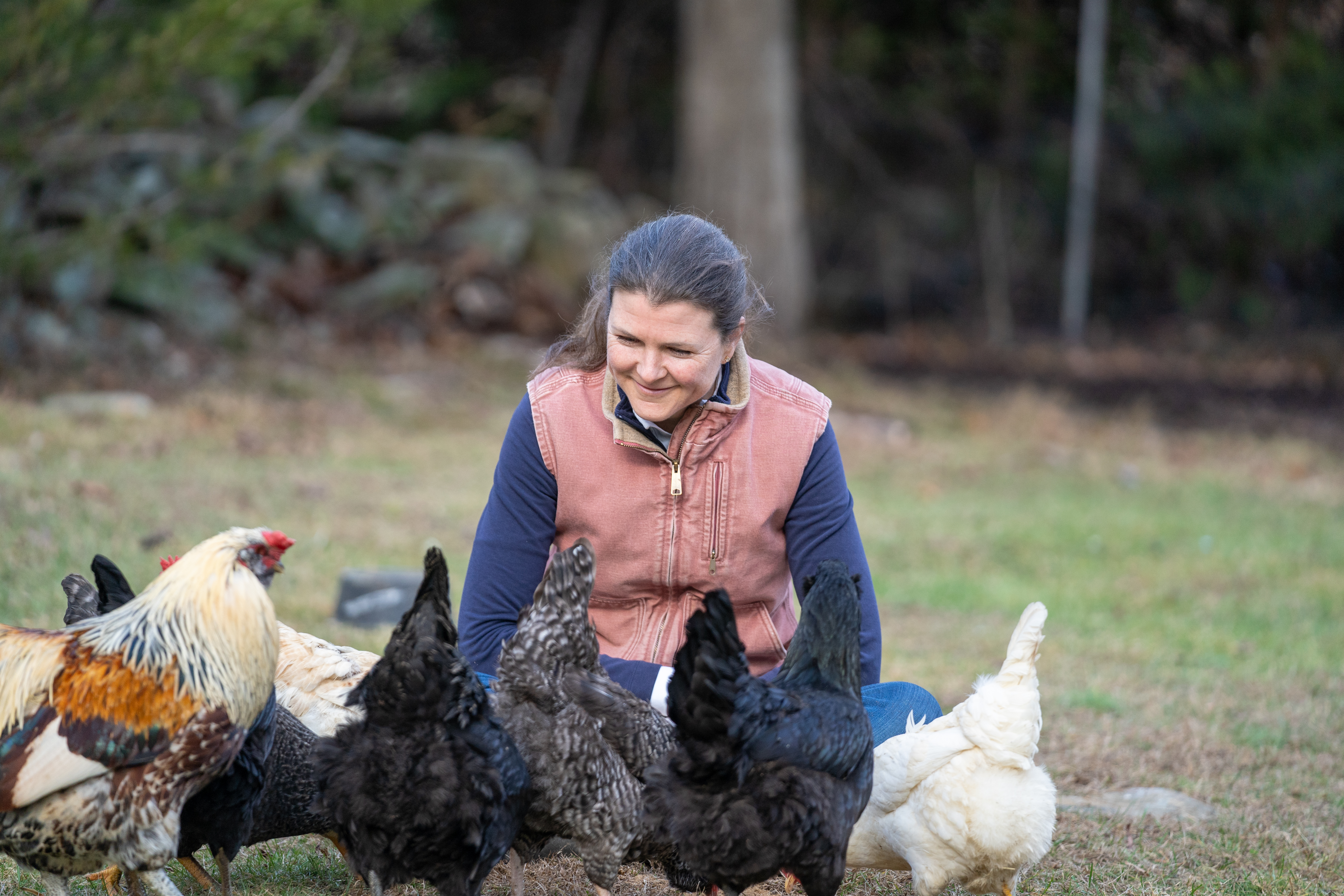
"I love being an ambassador for Omlet. For others to see my coops and runs in use with my chickens is super helpful for someone thinking about any Omlet coop. I am always honest about the coops and runs and knowing your options for whatever coop you choose is a great way to feel confident in your choice for your own way of chicken keeping."
Chicken keeping Facebook groups in Connecticut
Find other chicken keepers in Connecticut to chat with on these popular Facebook groups:
Protecting your flock from Connecticut weather
Spring
Spring is a great time to be a chicken in Connecticut. As the soil thaws and bugs and tender baby greens emerge, your chickens will find lots of fresh food to forage any chance they get. And the best part… BUGS! Grubs in particular are a favorite for chickens and as the grubs start to emerge from the soil on warm days, your chickens will be thrilled to find and eat as many as they can. Another common sight on a warm spring day is a sunbathing chicken. You’ll see a chicken plop down in a sunny spot, stretch a wing out and take a much deserved sun bath and probably a little nap. This is all normal, healthy and happy chicken behavior.
Summer
Chickens in Connecticut will experience a heat wave or three during summer. The heat and humidity are not ideal for our feather wearing friends, but it’s easy to create an environment that will help your chickens stay cool. Ensure your chickens have access to fresh water and a cool shaded area. Consider moving their Connecticut chicken coop into an area with lots of shade like against a wall or under a tree, where they can also make themselves a cooling dust bath. An insulated and ventilated Connecticut chicken coop (like the Eglu Cube) will prevent hot air penetrating the walls while enabling fresh air to flow through the house.
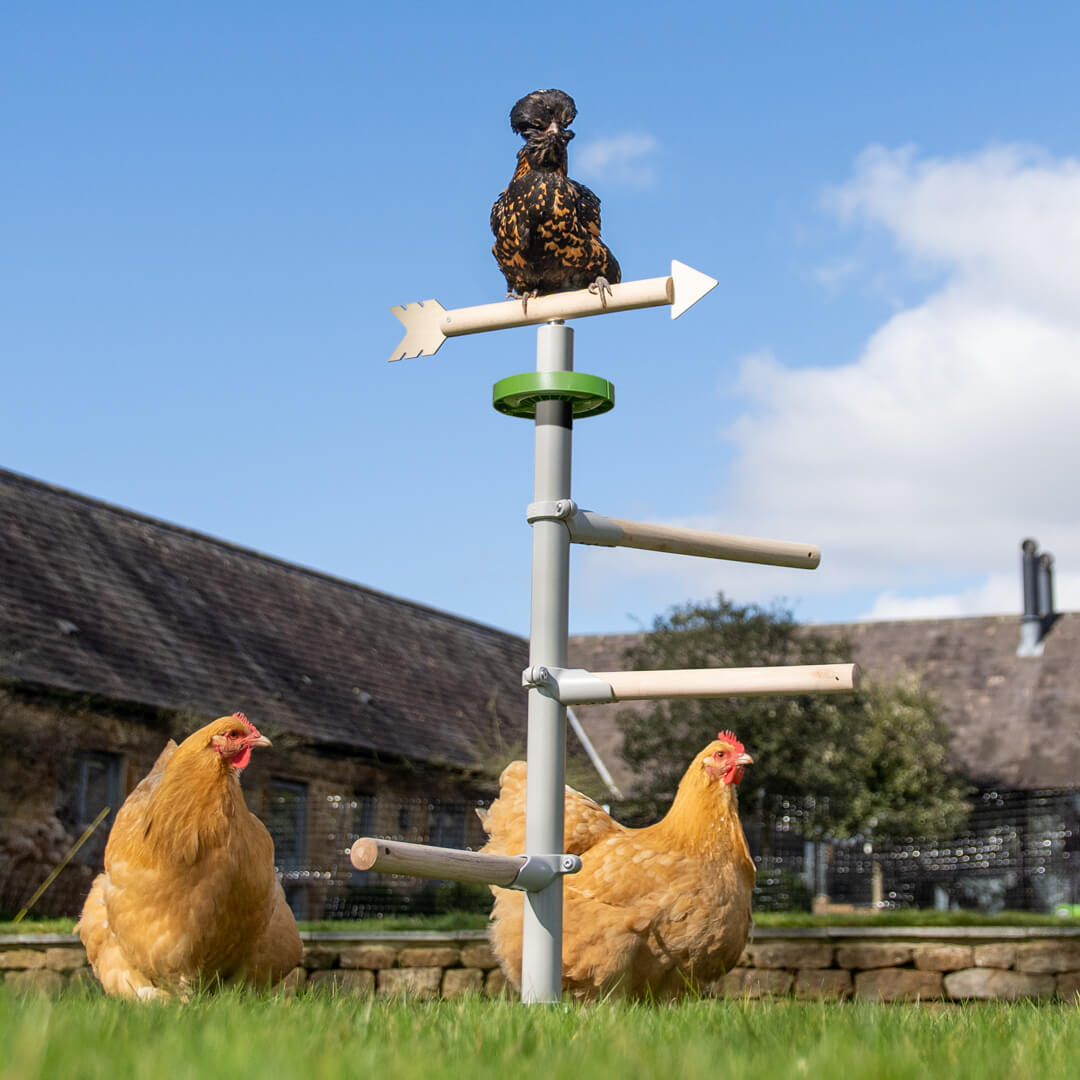

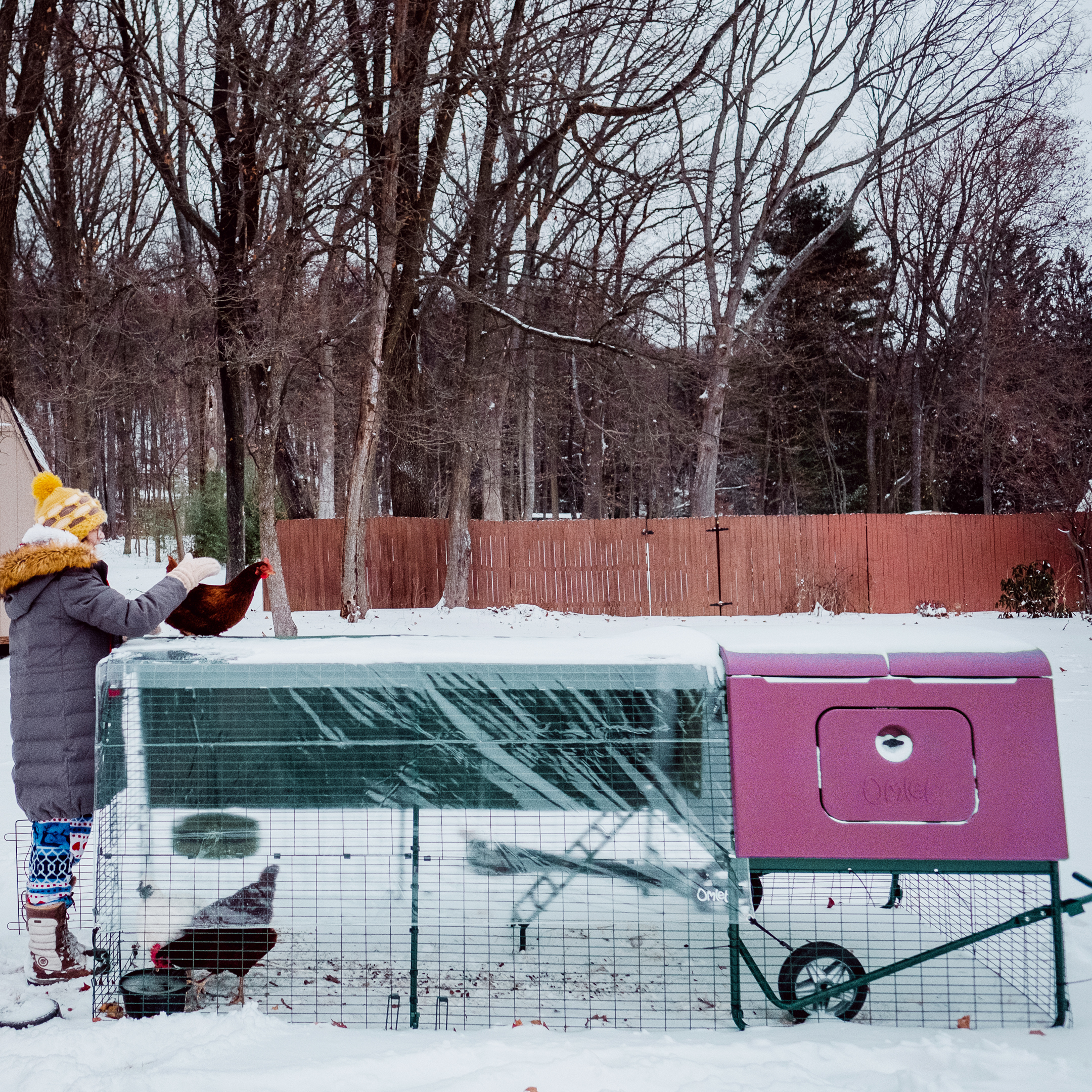
Fall
Once the leaves have fallen on Connecticut, the chickens love to forage among them. Your chickens will happily clean up a fallow garden getting the last scraps, greens, grasses and bugs – all favorite things for chickens to find and eat. Also with fall comes molting. Most chickens over the age of one year molt in the late summer to early fall. You’ll notice a lot of feathers on the ground and your molting chickens will look a bit ragged. Help your chickens prepare for fall by adding more protein in their diet during this time as their bodies dedicate the nutrients and energy to make new feathers and they may temporarily stop laying eggs. They will look wonderful with their new feathers which will come in all on their own, and your chickens will eventually lay again, sometimes not until the days start to get longer again.
Winter
Chickens have excellent natural insulation because of their feathers which helps them stay warm during cold Connecticut winters. What makes them uncomfortable is the cold combined with rain and wind. Their hen house chicken coop needs to be insulated to keep their heat in and the cold out, and waterproof to prevent rot and freezing in rain and snow. The durable Eglu Cube chicken coop designed by Omlet checks all the boxes. Prepare your chicken coop for winter by adding covers to the chicken run to protect them from the elements, and extra shavings on the floor or a PoleTree Chicken Perch will keep their feet out of the snow.
What happens when it snows?
When it snows in Connecticut, your chickens will be comfortable and warm inside a twin wall insulated chicken coop, like the Eglu Cube from Omlet. The weatherproof panels insulate against the cold, trapping your hen’s body heat inside to keep them warm. Shelter is available under the raised mobile coop, and you can add tarps over the run to keep the floor dry.
Chicken breeds suited to Connecticut weather
Some chicken breeds can handle the Connecticut cold better than others. Chickens with large, tall combs are most at risk of getting frostbite on the tips of their combs during very cold snaps. Small, short combs or rose combs are usually not affected.
These breeds handle Connecticut weather well:
Where can I buy chickens in Connecticut?
Most people purchase chicks from hatcheries or tractor supply stores. You can then raise your chicks inside your garage or house until they are old enough to go outside.
Common chicken predators in Connecticut
Common daytime chicken predators all year round in Connecticut are hawks - they will sneakily swoop down from high up, off a branch, a fence post or even a roofline. Foxes and bobcats like to come by during the day and night. Snakes will come by for rodents, but also eggs, so be sure to take in food at night and collect eggs regularly. At night coyotes, raccoons, possum, bears, fishers, and more will visit your chicken coop. Some of the wildlife are just curious, some will hunt the rodents that will always want to clean up spilled food, some want the eggs, and some want the chickens.
Protecting Your Flock from Connecticut Predators
A safe and secure chicken coop to shut your chickens in overnight is key to keeping the Connecticut predators disappointed. An attached, spacious enclosure, like Omlet's Walk in Chicken Run, for the daytime and/or supervised free ranging during the day, will give your hens space to stretch their wings without any heartbreak.
The Eglu Cube chicken coop is strong and durable, and the secure chicken run made from heavy duty steel weld mesh with a unique anti-tunnel skirt deters even the most persistent of predators from trying to break or dig through.
Do I need planning permission for my Connecticut Chicken Coop?
Each town in Connecticut has different chicken coop zoning regulations, usually focusing on permanence, height and location. Some towns also regulate if roosters are allowed and even if you’re allowed to keep chickens at all. Most towns allow hens in Connecticut, and in general, the Eglu Cube chicken coops don’t require formal permits, but should be kept within the lot line setbacks and other common sense regulations.
What your town defines as a structure that requires a permit can vary, but permits are not usually needed for any structure under a certain number of square feet, so consider compact and mobile chicken coops like the Eglu Cube. The most thorough way to make sure an Eglu coop is allowed is to ask the zoning officer of your town. Your town’s website will have a link for departments, and communicating via email is useful so that it’s all in writing and can be referred back to as you make decisions for a Connecticut coop and its placement.
How many chickens can I keep in Connecticut?
The number of chickens you can keep in Connecticut depends on which town you live in. Each area has different regulations about how many chickens you can keep and it can depend on the size of your backyard too. Check your local town’s chicken keeping regulations to be sure.
Caring for your flock with Omlet
Keeping chickens in Connecticut is easy with Omlet’s range of chicken coops and accessories. Designed by experienced chicken keepers, the Eglu chicken coops and Walk In Chickens Runs are engineered to keep your chickens safe from the common predators and harsh winter weather they will experience in Connecticut. Add innovative chicken perches and chicken peck toys to your hen’s space to provide entertainment and enrichment, and an Automatic Chicken Coop Door for your own peace of mind.
Local Pictures
Comments Leave a comment
There are no comments just yet